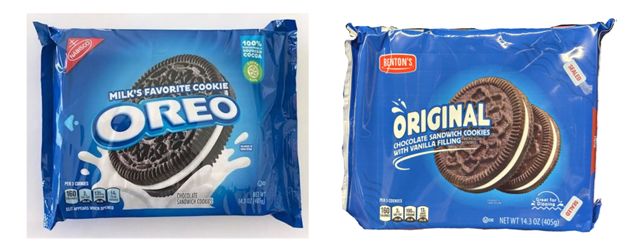Brand owner Mondelēz International – home of iconic names like Oreo, Ritz, TUC, and belVita – has taken legal action against retailer Aldi, alleging that Aldi’s private-label packaging deliberately mimics Mondelēz’s distinctive trade dress. According to the lawsuit, Aldi’s packaging applies “strikingly similar” color palettes, layout structures, and typographic choices, creating a strong likelihood of consumer confusion.
This isn’t just a packaging dispute – it’s a clash over the evolving role of store brands and the protection of brand equity in today’s CPG (consumer packaged goods) landscape.
What’s at stake
Consumer confusion: Imagine shoppers reaching for Oreo and unintentionally picking up Aldi’s “Choco Beans” simply because it evokes the Oreo style. Mundelez argues this dilutes the integrity of its brands.
Erosion of brand equity: Designs like Oreo’s blue-and-white scheme or Ritz’s red banner are visual signatures. When a private label echoes that visual language too closely, it can diminish the brand’s value and recognition.
Legal precedent: A win for Mondelēz could redefine the boundaries of “trade dress” protection, giving brands firmer ground to challenge visually similar competitors – even if they’re not copying logos verbatim.
Broader industry implications
Private-label mobility: Retailers like Aldi, Lidl, and Costco have built successful brands of their own, offering quality at lower price points. But as they move toward premium positioning, they must be cautious not to overstep into “confusability”.
Elevated focus on packaging design strategies: Brands are doubling down on packaging IP – color registers, font families, unique layouts, and even packaging materials – to ensure distinctive, protectable assets.
Potential ripple effects: If the court rules in favor of Mondelēz, expect a wave of warnings or lawsuits from major CPGs (think Nestlé, Kellogg’s, PepsiCo) as they look to reinforce packaging defenses against private-label encroachment.
What’s the wider public and expert reaction?
Brand protection advocates argue this is “a necessary step to preserve brand identity and consumer trust” – reinforcing that strong branding relies on consistency and visibility.
Private-label supporters counter that private brands drive competition, offer value to consumers, and should be allowed to “echo” premium products, provided there’s no intent to deceive.
Legal analysts emphasize key questions for the court:
• Are Aldi’s designs “substantially similar” in total impression?
• Does evidence exist of actual (or likelihood of) consumer confusion?
• Can Mondelēz prove it has actively protected this trade dress in past cases?
✅ 📌 Note: This is an ongoing legal matter – stay tuned.






